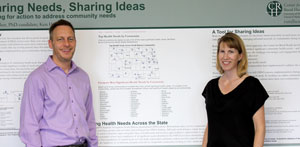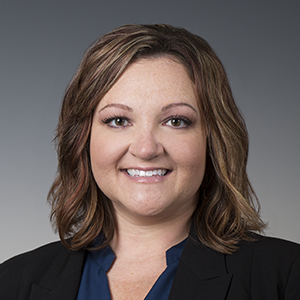Around the World in Rural North Dakota
Community Health Needs Assessments focus rural health efforts.
By Nikki Massmann on

Center for Rural Health staff members Karin Becker and Ken Hall have driven enough miles to nearly travel around the earth at the equator—all without leaving North Dakota. They have interviewed rural North Dakota residents about community health issues for 155 hours and facilitated community meetings everywhere from hospital board rooms to bowling alleys.
Since 2011, Karin and Ken have been conducting Community Health Needs Assessments throughout the state. Community Health Needs Assessments (CHNAs) are mandated by the Affordable Care Act. All nonprofit hospitals must conduct a CHNA every three years and address the relevant findings in their strategic plans. Research is conducted to gather input and prioritize health-related issues within a community, such as a high rate of obesity or a shortage of physicians. Several avenues are used to gain insight into the community's needs, including interviewing community leaders, conducting focus groups, and sending surveys to community members. Some issues, such as those regarding healthcare access, can be improved upon by the hospital. Other identified issues, such as an elevated rate of binge drinking, are not necessarily ones that can be directly addressed by the hospital in an official capacity but by the community as a whole. The main purpose of a CHNA is to guide the hospital's strategic plan to meet the needs of its community, but the outcomes are much broader than that. Oftentimes the prioritized issues within a town lead to action at the community level in the form of an awareness campaign or a newly developed health coalition.
There are several models and toolkits for conducting CHNAs. Many of them are designed to work in urban areas or are pared down versions that have been modified for use in rural communities. The Center for Rural Health has a long history of conducting needs assessments and strategic planning with rural communities and refined the process to meet both community needs and the needs of the hospital under the Affordable Care Act. The CRH's CHNA process has received national recognition and has been presented at national conferences, and the results have been shared with the North Dakota Legislature.
"What makes this process work is that it wasn't developed in an urban area," said Hall. "We started conducting CHNAs in rural North Dakota—this method was built specifically around the characteristics and resources of a small town."
CHNAs by the Numbers
| CHNAs conducted: | 21, with four in process |
|---|---|
| Miles driven: | 21,446 |
| Surveys: | Over 4,500 |
| Interviews conducted: | 155 |
| Focus groups: | 38 |
| Focus group participants: | 402 |
The process used by the Center for Rural Health's CHNA team involves an initial community meeting or focus group, where health data on their specific community are presented. The data include key health indicators such as disease prevalence and health risk behaviors that are present in a community. These statistics are shown in comparison to state and national data, and it serves as a springboard for discussion of local issues. A series of interviews with community leaders is also conducted, and surveys are distributed throughout the community. Once survey results are analyzed, a second focus group is scheduled and the results are presented. At that focus group, the citizens in attendance work together to prioritize the needs that were identified in their community. To date, the Center for Rural Health has conducted CHNAs for 21 of North Dakota's 36 rural hospitals, with four more currently in process. This service is provided through the federal Health Resources Services Administration's Medicare Rural Hospital Flexibility Grant Program, administered through the Center for Rural Health.
Both Hall and Becker emphasize that while they facilitate CHNAs, the hospitals and communities lead the process. A steering committee is formed of local community leaders who know the pulse of the community. Hall and Becker rely on the steering committee to select local participants so that there is more community buy-in and engagement. A successful CHNA focus group has representation from many areas in a community: education, public health, transportation, faith-based, youth, families, law enforcement, social services, local businesses, and more.
Health needs and issues prioritized during the focus groups vary from community to community. While most of them mirror national health issues, such as addressing obesity or tobacco use, some of them differ greatly.
But when you dig down, issues manifest themselves very differently in communities that may only be 30 miles away from each other.
"Rural America gets painted with a broad brush," said Hall. "But when you dig down, issues manifest themselves very differently in communities that may only be 30 miles away from each other."
"A mental health need in one town might mean a shortage of counselors," Becker said. "And in another, it is prioritized because of an elevated level of substance abuse."
These differences in community needs have all been compiled onto a website where a user can compare and contrast the top health needs identified by individual communities in North Dakota. An interactive map shows which communities prioritized certain categories of health issues, and provides ideas for addressing those issues at a community level.
Now that the initial cycle of CHNAs has been completed in North Dakota, Hall and Becker are beginning with the next phase: implementation. They are taking the results of communities' CHNAs and providing technical assistance around strategic planning for hospitals and communities to address their priority issues. Innovative ideas for addressing these issues have been gathered through CHNAs, many of which have been used successfully in communities already and encourage collaboration.
"It's one thing to identify the needs in your community," said Becker. "But what people really want to know is what they can do about it."
What's been rewarding for Hall and Becker is seeing changes being made in communities as a result of the CHNAs. One particular community hadn't realized how acute their need was for mental health services. Within a few months of the assessment, the hospital was working on hiring a psychiatrist.
"It really drives the point home that these aren't just academic exercises—real changes are being made," Hall said.
While traveling around the world without leaving North Dakota has been exhausting at times for the CHNA team, the experience of helping people and communities is altogether rewarding. The CHNA process has resulted in increased awareness within communities of their own unique health issues and is providing resources to address those issues.
This article originally appeared in the Summer 2014 issue of North Dakota Medicine.


 is the Director of Communications at the Energy and Environmental Research Center (EERC). Prior to her position at the EERC, she served as Communication Coordinator at the Center for Rural Health at the University of North Dakota's School of Medicine & Health Sciences.
is the Director of Communications at the Energy and Environmental Research Center (EERC). Prior to her position at the EERC, she served as Communication Coordinator at the Center for Rural Health at the University of North Dakota's School of Medicine & Health Sciences.



